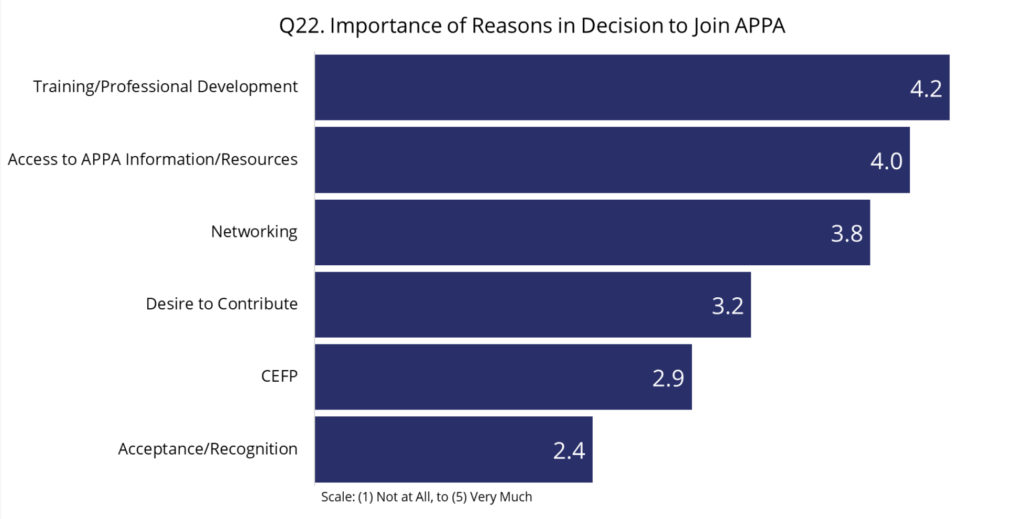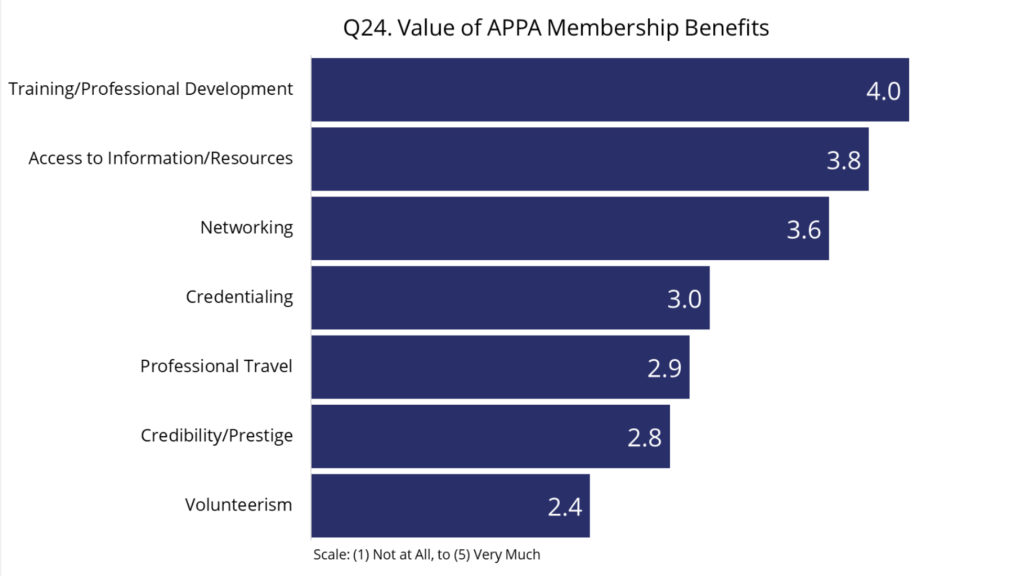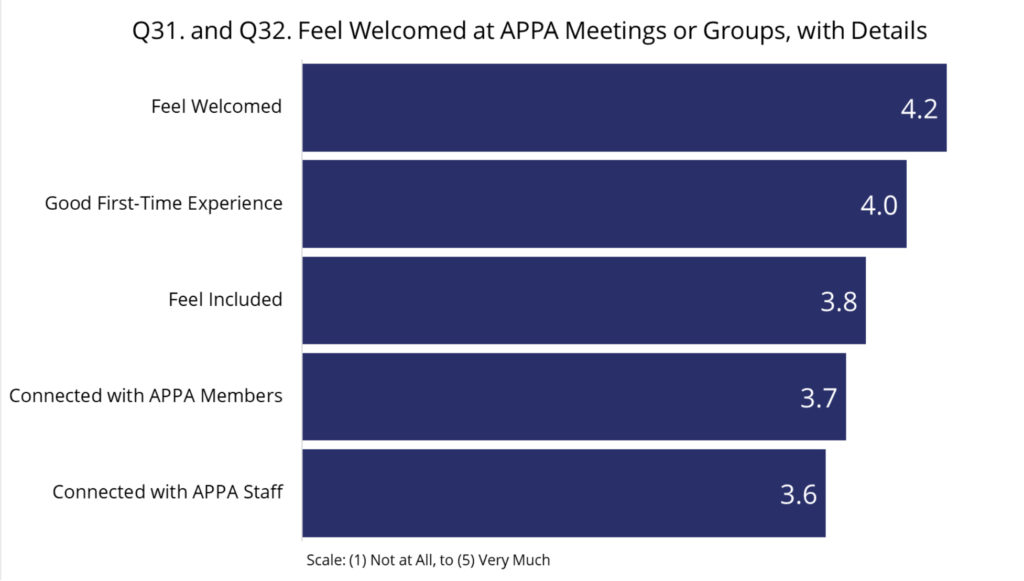“Making friends and colleagues at APPA has been terrific; sharing trade info and expertise has been invaluable.”
In 2022, Demographic Perspectives (DP) conducted a study of institutional and affiliate membership for APPA to gather insights on the value of the organization to its members, members’ workplace challenges and pain points, and how those challenges can be addressed by participation in the association. APPA senior leadership was particularly interested in how diversity and inclusion are being addressed within the organization and what resources, including programs, services, and activities from APPA, could best serve its members.
DP used an ethnographic approach, with stakeholder interviews, participant observation of online member meetings, survey responses, and member listening sessions, to reveal members’ behaviors and motivations. Using interviewing techniques to collect demographic, behavioral, and psychographic information helps to inform why members join APPA, why they may or may not be committed to it, what it means to them, why they value it, and what other organizations they value. This participant observation method allowed DP to examine the way that members interact with each other and to identify behavior patterns among members and organizational challenges.
Who were the respondents and participants? 1,349 APPA institutional and affiliate members responded to the survey (10% of those who received it). It is important to view the survey results in this context: the survey respondents were more heavily weighted toward members who were male, 50+ years old, have been APPA members for at least 15 years, and have been in Facilities Management for at least 20 years. They were also more likely to have a master’s degree or Ph.D.; to have the title of CFO, SFO, Director, Associate, or Assistant Director; and to be CEFP (Certified Educational Facilities Professional) credentialed. We hope that younger members and newer members will take the opportunity when they can to provide feedback to APPA.
In stakeholder interviews and listening sessions, we heard from a broad spectrum of participants with a range of ages, race/ethnicities, and gender, who spoke to similar themes with more detail and insight.
Lastly, as part of the ethnographic approach, we attended three online committee meetings and two APPA-sponsored in-person conferences where we were able to listen to the interactions between members and the issues that were being raised.
Hereafter, those who participated in stakeholder interviews, listening sessions, online committee meetings, and in-person conferences will be identified as “participants,” while those who responded to the survey will be identified as “survey respondents.”
Overview
Survey respondents viewed APPA membership as valuable and consistent with the factors that they perceived necessary for career success. APPA provided training and professional development, access to an extensive library of information and resources, and lastly, networking with others in the field. The training and development that respondents highlighted included the Supervisor’s Toolkit, Leadership Academy, and the CEFP certification. Participants underscored that they felt that the training from APPA was exceptional.
“I found both the APPA [Institute for Facilities Management] and the Leadership [Academy] extremely valuable because the Institute allows me to learn about facilities issues beyond my area of knowledge, and leadership helped me in so many ways to be a better leader within the organization.”
 The Body of Knowledge was cited extensively by survey respondents and participants as providing the basis for documentation in some areas of Facilities Management programming. They noted that the Operational Guidelines trilogy (Custodial, Grounds, and Maintenance) have become the gold standard in institutions and are recommended to many new managers. The benchmarking assisted all participants in evaluating and implementing best practices in their organization.
The Body of Knowledge was cited extensively by survey respondents and participants as providing the basis for documentation in some areas of Facilities Management programming. They noted that the Operational Guidelines trilogy (Custodial, Grounds, and Maintenance) have become the gold standard in institutions and are recommended to many new managers. The benchmarking assisted all participants in evaluating and implementing best practices in their organization.
“Having the performance indicators help[s] us set the staffing and maintenance/cleaning levels for our existing, renovated, and new buildings. The Body of Knowledge is a great resource for just about any question you may have come up in any area of the facilities field.”
In the stakeholder interviews, listening sessions, and the survey, networking is identified as the most valuable resource of APPA. Participants bonded on sharing information and experiences in Facilities Management. Local and regional chapters were identified as being very collaborative, with significant communication among members. While there was a preference for networking to be in-person, virtual connections worked well and were appreciated during the pandemic. The networking was local, regional, national, and international.
“I think the most significant value is in building the network of colleagues and friends in FM. One of the most effective ways to do that is at the Regional Level as there is more face time to building those relationships.”

80% of all survey respondents would recommend or strongly recommend APPA to colleagues. There was a strong sense of community within the APPA professional development activities and within the national and international programming. Respondents felt welcomed to meetings and groups and they felt encouraged to participate and contribute to the organization. There is a respectful sharing of ideas, and respondents noted that they connected to each other and APPA in general. All of this is very positive information, but we needed to get more granular.
Members’ Careers
What are the characteristics of the membership? Overall, Facilities Management is changing. Traditionally the field has been male dominated, but discussion and comments among participants suggested that more women are joining the field and Facilities Management is becoming younger as well as more racially and ethnically diverse.
While 22% of the survey respondents have a CEFP credential, almost half of all the survey respondents have another credential, though these tended to be occupation and skill specific.
 Why do people join APPA? Survey respondents noted that unlike other professional Facilities Management organizations, APPA’s programming is primarily about leadership and management, rather than operations or specific technical knowledge. People joined APPA because someone at work encouraged them to do a particular program or take specific training, particularly their manager or supervisor. Managers and supervisors who were already involved sent direct reports and staff for training, and some were able to arrange for scholarships.
Why do people join APPA? Survey respondents noted that unlike other professional Facilities Management organizations, APPA’s programming is primarily about leadership and management, rather than operations or specific technical knowledge. People joined APPA because someone at work encouraged them to do a particular program or take specific training, particularly their manager or supervisor. Managers and supervisors who were already involved sent direct reports and staff for training, and some were able to arrange for scholarships.
What defines career success in Facilities Management? Survey respondents underscored that supervisors and managers are important to an individual’s career success and that support and recognition within one’s organization can facilitate career growth. Organizational stability and budget are the most significant institutional challenges, but respondents also mentioned that lack of communication within a department has a significant impact. Respondents noted that a change in executive leadership has the greatest impact on future work and, the more senior the individual’s position, the more likely that change will affect their work.
Professional Development
How does APPA support professional development? APPA provides a significant portfolio of training programs for members. The professional development programs such as the Supervisor’s Toolkit, the Institute for Facilities Management, and the Leadership Academy have great value for members who answered the survey as well as for those in the stakeholder interviews, listening sessions, online meetings, and conferences. Those in senior positions value the Body of Knowledge more than management or staff/administrative members. The Body of Knowledge, as well as webinars and online publications, such as Facilities Manager Magazine, Inside APPA newsletter, and reports from APPA, provide best practices, benchmarking, industry standards, and procedures being used by other institutions.
Additionally, most survey respondents’ institutions see value in the APPA professional development and support respondents by funding in-person and virtual activities, registration, and travel expenses. While CEFP certification may not be the foremost reason to join APPA, once facilities professionals become APPA members, they see the CEFP as an important certification.

Belonging and Community
Where do respondents feel a sense of community? Survey respondents and participants feel a strong sense of community within APPA professional development programs and national/ international programming. Most feel welcomed at APPA meetings or in groups, regardless of their job level. Those who facilitate APPA meetings and groups are successful in connecting members and ensuring that participants have good experiences.
“At ERAPPA [APPA’s Eastern region], first-time attendees are introduced and encouraged, as well as 2nd year ‘bounce backs.’ They are the future of Facilities Management as a profession, they are younger, more diverse, and we want them to feel involved.”
Participation is a very positive experience, and most respondents note that they feel encouraged to be involved and to speak at and contribute to the meetings and groups. They feel respected, valued, and listened to. However, several of those in listening sessions noted that APPA events tend to be close-knit with lots of connecting among those who already know each other. Newer members and members who do not have colleagues at an event may feel isolated. Focusing on inclusion, with techniques shared with us by members of ERAPPA, would be a positive strategy for all national, regional, and local groups.

Does APPA have a diverse membership? Generally, survey respondents feel that APPA membership seems more diverse than leadership or professional staff. They note more progress in making membership diverse over the last several years. Participants noted sexism within the educational facilities field by occupation as well as within institutions. Other participants noted that there are more underrepresented groups and younger individuals in educational facilities at the lower levels, but very few underrepresented groups or women as senior managers. One important finding from the survey was that if respondents perceive APPA membership as diverse, they are more likely to recommend APPA to colleagues.
“Being a woman in Facilities can be lonely, especially when in a leadership role. Having more opportunities for connection and mentoring would be great.”
“Provide more support to minority Facility Leaders to help them in their career with challenges they are facing. Navigating local political waters sometimes becomes an issue where Facility Leaders need help and support.”
In the listening sessions, there was a strong suggestion by several participants that APPA may want to be “more purposeful and intentional in invitations to diversify membership and volunteer leadership.”
It is important to note that we found no significant differences in responses among survey respondents by demographic characteristics including age, race/ethnicity, gender, LGBTQ+, or disability status. All groups shared a similar view of APPA.
CEFP Certification
Who pursues the CEFP certification? 22% of the survey respondents have the CEFP certification. More of the respondents with the CEFP were in senior positions and more men have the CEFP. While 75% of respondents are aware of the CEFP, management and staff/administration are not as familiar with it as senior management. Of those who are familiar, 39% have considered it but not registered, and 26% have not considered it.
Respondents focus on the CEFP as a personal achievement since many feel that their institutions do not value the credential professionally.
“[The CEFP] was a vigorous program that took an appropriate amount of knowledge and effort to complete. Possibly add diversity training and potentially an added level of technical training for non-engineers.”
 Work responsibilities can interfere with professional development like CEFP credentialing. The competing work priorities are more of an issue for management respondents than for those in senior positions or staff/administration. Respondents noted that institutional acknowledgment of the credential is often lacking. Another issue is funding; almost one-third of those who are familiar with the CEFP are waiting for institutional funding to move forward.
Work responsibilities can interfere with professional development like CEFP credentialing. The competing work priorities are more of an issue for management respondents than for those in senior positions or staff/administration. Respondents noted that institutional acknowledgment of the credential is often lacking. Another issue is funding; almost one-third of those who are familiar with the CEFP are waiting for institutional funding to move forward.
“I applied and got a scholarship. I was not allowed to use work time to complete study for the CEFP; it was not acknowledged within the department. I think that some education of the value of this credential to the institution is important for them to understand the value we can bring.”
We heard from both survey respondents and participants that the CEFP is an important credential. Thus, both APPA and institutional leadership share the responsibility of promoting the CEFP by advertising its value and by supporting and celebrating staff who devote the time to the credentialing process.
Where Does APPA Go Now?
Respondents to the survey and participants in the stakeholder interviews, listening sessions, online meetings, and in-person conferences underscored the value of APPA to their professional development and provided excellent feedback on ways in which APPA can better serve its members in the future. That feedback is being addressed by senior leadership, and strategies will follow in a future article.
Carol Shuchman is principal of Demographic Perspectives LLC, New Haven, CT. She can be reached at [email protected]. Rena Cheskis-Gold is the CEO and founder of Demographic Perspectives, LLC. She can be reached at [email protected]. This is their first article for Facilities Manager.



